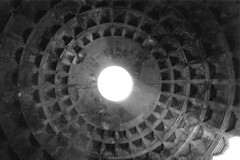I came across a very interesting essay the other day entitled In Defense of Disbelief by Ralph C. Wood, a Baylor University professor. I think it does a pretty good job of defending the necessity of Dogma in Christian thought as a provider of freedom rather than a bringer of discord. I’ll quote a short excerpt here, but I encourage you to read the rest of the article. It’s very blunt, which I think makes it ideal fodder for blogosphere discourse!
A healthy dose of Christian disbelief or "holy skepticism" would serve as a much-needed antidote to the soft-core spirituality that saps much of contemporary Christianity, especially in its evangelical expression. An anti-doctrinal sentimentality often rules the worship and the art of our churches, where self-serving emotions are exalted over true mystery. The church of our time needs a theology that repudiates all saccharine substitutes for the hard thinking that Christian faith requires.
As in so many other matters, Flannery O’Connor foresaw our reduction of transcendent faith to sentimental subjectivity. She likened it to the scientific process whereby the wings can be bred off chickens to produce more succulent white meat. O’Connor said that it is possible to breed the moral and theological sense out of people in a similar way. She described our current generation as a brood of wingless chickens. This is what Nietzsche meant, she explained, when he declared God dead. It also means that nihilism is the atmosphere of our age, the gas that we all breathe, whether inside or outside the Church. The Church has made Christianity nearly indistinguishable from the coziness of a warm blanket and the kindliness of a golden heart…
…O’Connor believed that Christian dogma is what forms the Christian imagination into something larger than our own intelligence or the intelligence of those around us. Knowing that the word "dogma" is a pejorative term for most Americans, O’Connor boldly capitalized it, confessing in the upper case that "My stories have been watered and fed by Dogma." She rejected the popular view that dogma divides while ethics unite and that, since the practical and the useful are what truly matter, we can dispense with dogma. So long as everyone loves Jesus, according to the prevailing sentimentalism, doctrinal claims can be shelved. O’Connor believed, on the contrary, that dogma must be central rather than peripheral. It is the distilled essence of God’s self-identification in Israel and Christ, and thus the true means for understanding both ourselves and the world. "Dogma is an instrument for penetrating reality," she declared. It "is about the only thing left in the world that surely guards and respects mystery."
For Flannery O’Connor, "mystery" is not synonymous with "puzzle" and "riddle" - for those conundrums that balk the mind and stifle all understanding. Nor is mystery another name for a spirituality so vague that it cannot distinguish between John of the Cross and Max Lucado. "To St. Paul and the early Christian thinkers," wrote Claude Tresmontant, one of O’Connor’s favorite biblical scholars, "[mystery] was on the contrary the particular object of intelligence, its fullest nourishment. The musterion [a Greek word that can also be translated sacrament] is something so rich in intelligible content, so inexhaustibly full of delectation for the mind that no contemplation [of it] can ever reach its end."
06 November, 2007
Subscribe to:
Post Comments (Atom)

No comments:
Post a Comment